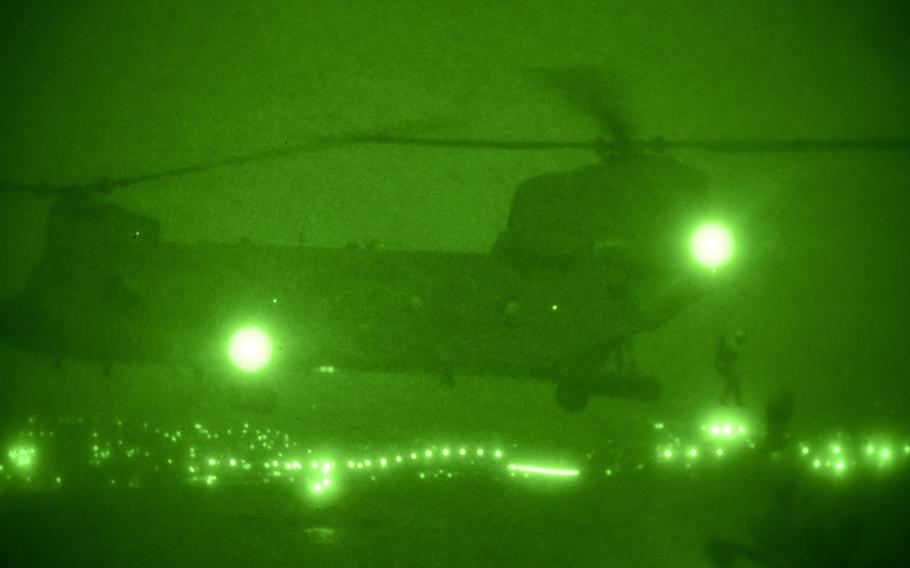
U.S. servicemembers assigned to Naval Special Warfare Command conduct helocasting operations from a CH-47 Chinook helicopter assigned to the 25th Combat Aviation Brigade at Pearl Harbor, Hawaii, July 25, 2019. (Ryan DeBooy/U.S. Army)
WASHINGTON — The top general in charge of U.S. commando forces has ordered a review of the culture and ethics within Special Operations Command after a series of high-profile incidents in recent years have tarnished the military’s most elite units.
Army Gen. Richard Clarke, the SOCOM commander, ordered the comprehensive review in a memorandum sent last week to his entire force. The review was to start immediately and conclude by the fall, he wrote.
“This is about making us better,” Clarke wrote in the memo, which was first reported by NBC News.
“The American people must trust those who protect them, including the special operations professionals in this command,” he wrote. “This trust is paramount and must never be compromised … Recent incidents have called our culture and ethics into question and threaten the trust placed in us.”
Clarke wrote all units within the command would be visited by top leaders and encouraged special operators to be “open and candid” with them.
Clarke’s review comes on the heels of an ethics and culture review ordered late last month by the Navy’s top SEAL officer. Rear Adm. Collin Green, the chief of the Naval Special Warfare Command, launched the inquiry into the conduct of his organization following a string of recent incidents within the SEALs, including accusations of war crimes, charges of illicit drug use, drinking on duty in the Middle East, sexual assault and the involvement of two SEALs in the murder of a Green Beret.
The letter came immediately following reports of a Navy SEAL team being suddenly sent home in July to San Diego from Iraq over accusations of drinking alcohol during an Independence Day celebration, during which an alleged sexual assault on a female servicemember working with the team occurred.
That incident came just weeks after the acquittal of Chief Petty Officer Edward Gallagher on charges of war crimes, including murder in the 2017 killing of a wounded Islamic State captive. During the court-martial, fellow members of SEAL Team 7 testified team members drank and partied during their free time in Iraq.
In the homicide case, one SEAL, Senior Chief Petty Officer Adam Matthews, a former member of the Naval Special Warfare Development Group, or SEAL Team 6, was convicted this year for his role in the 2017 strangling death of Green Beret Staff Sgt. Logan Melgar in Mali.
Another member of the SEALs, Senior Chief Petty Officer Tony DeDolph, faces charges, including murder, in that case. Two elite Marine Raiders were also implicated in Melgar’s death, which has been described as an accidental killing during a hazing event after the elite troops had been out drinking. One of the Marines, Staff Sgt. Kevin Maxwell Jr., was convicted this year for his role in Melgar’s death. The second, Gunnery Sgt. Mario Madera-Rodriguez, like DeDolph, still faces charges in the death, including murder. DeDolph and Madera-Rodriguez are expected to face court-martial later this year.
In a separate case, former Green Beret Maj. Matthew Golsteyn faces a court-martial on murder charges for the 2010 death of a local Afghan that he suspected of being a Taliban bombmaker. Golsteyn has admitted to the killing, but he has pleaded not guilty and claimed the man was a legal target.
Clarke wrote in his memo that special operators face the “most complex environments” of any military forces, but he stated that was not an excuse for misconduct.
“We are the nation’s special operations force and we remain intensely focused on accomplishing our mission while upholding the highest standards of ethical conduct — each and every day, as individuals and teams, at home and while in harm’s way,” he wrote.
dickstein.corey@stripes.com Twitter: @CDicksteinDC